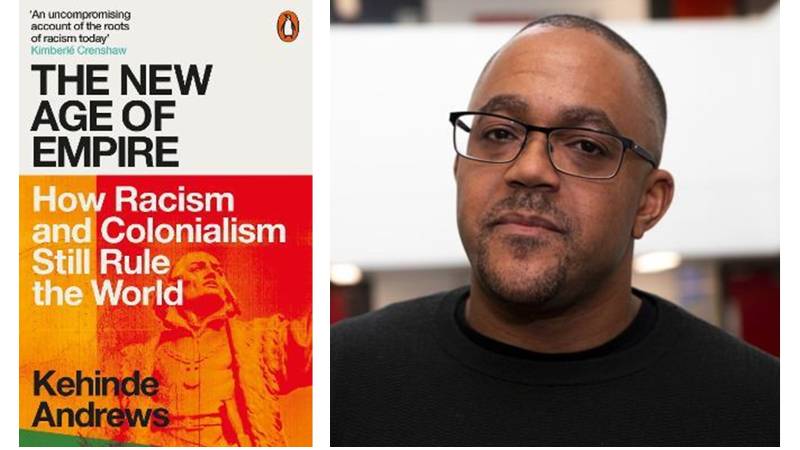
Kehinde Andrews, an African-American author and a professor at the School of Social Sciences at Birmingham City University, is renowned for his work centred on the resistance against racism. His debut book Black to Black testifies to his comment to uniting Black communities. And it is Birmingham where Andrews spent his formative years.
This book holds immense importance in understanding the historical and contemporary dynamics of the Western world on a global scale. Before embarking on this book, one might carry a multitude of positive of inspiring perceptions about the Western world. However, upon perusing its contents, a great shift occurs in our perspective.
Andrews introduces us to an alternative aspect of the West, shedding light on the dark, distressing episodes that have stained its history. The undeniable truth is that in the 15th century, Europe was not inherently superior to the rest of the world. Its ascendancy came about post-15th century, fuelled by the colonisation of the world.
In this book, Andrews delves into how racism and colonialism continue to exert influence over the world. The Atlantic Ocean played a pivotal role, serving as a foundational reason for Europe's global dominance. Hence, the Atlantic represents the dawn of the Western world. Yet, beneath the Atlantic's surface lie the unmarked graves of countless African slaves.
The book is structured into eight interconnected chapters, each building upon the preceding one. Within these chapters, Andrews offers an exhaustive exploration of colonialism, genocide, slavery, imperial democracy, racism, and the modern age of empire. He delves into the Western world's perpetration of genocide in its colonies, such as Africa and Asia, and how it amassed wealth by exploiting colonial resources. Colonisation stands as the linchpin for Western affluence. Another critical contributor to the West's wealth was the African slave trade, a significant underpinning of the Western economy and agriculture. Columbus, according to Andrews, was the world's first slave trader.
Wealth and resources in the West were tied to genocide, slavery, and colonialism. Notably, the European industrial revolution owed much of its progress to the labor of black slaves. Despite this, European intellectuals, including Immanuel Kant, perpetuated racist beliefs about Africans, deeming them lazy and inferior. These prejudices played a pivotal role in shaping the modern concept of races and white supremacy. The writings of European figures such as Hegel and John Locke reveal deeply ingrained racism.
Andrews employs cogent arguments to dispel the notion that the West, both in the past and the present, serves as a true role model for the world. He asserts that, in the past, the West established its global dominance through direct rule and exploitation. Today, the West exerts control through institutions and global exploitation. Furthermore, he dismantles the myth that the West's foundations were laid by the great revolutions in science, industry, and politics. According to Andrews, these revolutions evolved from the backdrop of genocide, slavery, and colonialism. These atrocities form the foundational pillars upon which the West constructed these revolutions.
The Enlightenment era emerged at a time when Europe was laying the groundwork for genocide and asserting its dominance through colonial expansion. The Enlightenment played a pivotal role in ushering in the new age of empire. Despite this, many white men persist in believing that they are civilizing the world.
Andrews highlights the detrimental impact of British colonial rule in India, demonstrating how a once-rich nation with a significant share of global trade plummeted to economic underdevelopment and stagnation under British colonisation. The Indian subcontinent suffered immensely, with millions perishing in famines. Winston Churchill's role in diverting grain from India to Britain during a famine underscores the extent of British responsibility. Andrews asserts that India's colonial past is a stark illustration of the devastating consequences of Western imperialism.
In contemporary times, the West continues its global domination, albeit through institutions. The United States has assumed the role of modern colonial power, with organisations such as the United Nations (UN), International Monetary Fund (IMF), World Bank, and World Trade Organisation (WTO) playing crucial roles in neo-colonialism worldwide. The UN, often regarded as a global institution with a stellar reputation, is intricately intertwined with the IMF and the World Bank, both headquartered in Washington, D.C., within the United States. The IMF's shift in the 1970s from supporting Western countries to providing loans to underdeveloped nations under stringent conditions marks a significant change in its role as a tool of neo-colonisation.
Andrews identifies the United States as an extension of European colonialism, ushering in what he dubs a new age of empire. He contends that this era commenced with the discovery of America, with Christopher Columbus representing the inaugural figure of colonisation. Presently, the United States maintains over 800 military bases in more than 70 countries and has invested trillions of dollars, particularly in the invasion of Iraq in 2003. Guantanamo Bay's imprisonment of nearly 800 people epitomises the blatant expression of hard power in the twenty-first century. Andrews tackles numerous other vital aspects in his book to help readers comprehend the past and present face of global colonisation.
The West continues to exert its dominion over the world. Major political theories, such as democracy, socialism, communism, and nationalism, emerged from Europe, exemplifying its far-reaching influence. The West's colonialism extended beyond politics and the economy to encompass culture, language, values, and customs. The West has colonised every facet of our existence. Thus, the West is not our role model; rather, it is our coloniser. We need to decolonise our minds. That, indeed, is the main theme of this book.

